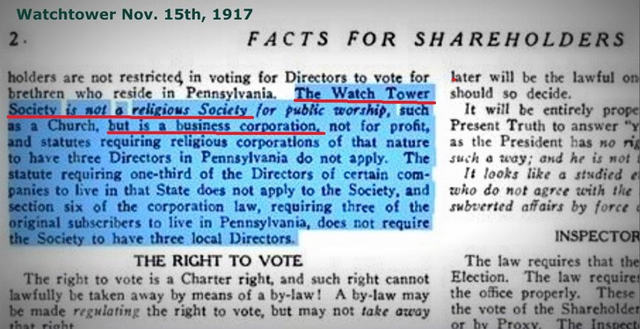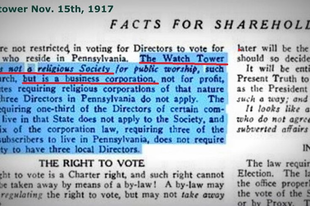A Mindenkinek Jehova Tanúiról oldalról
kedves Jónás moderátor
törölte az ŐrtoronyŐrök oldalon is feltett,
a Mindenkinek Jehova Tanúiról oldalra bemásolt
hitelességfirtató kérdést két BUÉK-ozás KÖZÜL!!!
merthogy "nem értelmezhető abban a témakörben" !!!
A kép és az idézet:
Ortorony - 1917. november 15.:
Tajekoztato a reszvenyesek szamara:
"Az Ortorony Tarsulat nem egy nyilvanos imadatnak helyt ado vallasi tarsasag, mint egy egyhaz, hanem egy uzleti vallalkozas..."

Az a személy, akinek jogosultsága volt a hitelességet firtató kérdésemet törölnie, burkoltan azt állítja, hogy
mivel nálam látta először ezt a képet és idézetet,
így nekem kell annak hitelességét bebizonyítanom!
Az igen, kedves Jónás!
Jónás_ 2020.01.08. 18:34:00
"A képen látható felirat jól láthatóan utólagos.
Az eredeti képen rajta van az eredeti könyv címe is, ámde valamiért nem az, hanem ez került publikálásra. Az eredeti kép nagyon kis felbontású, talán Awake van rajta? de nem látni jól, de semmiképp nem Watchtower szerintem."
Kedves Jónás, csak nem csatlakoztál ismét Jehova Tanúi világméretű szervezetéhez, hogy ennyire megbicsaklott a gondolatmeneted?
Törlöd a hitelességre vonatkozó kérdést a BÚÉK-ok közül, majd idejössz hitelességet firtatni, ember???
És még büszke is vagy rá???
Az Égi Szekér témakörben össze-vissza BÚÉK-oznak, az persze belefér a fenenagy igazságérzetedbe, de az, hogy egy, a Jehovatanúi.blog által kirakott kép hitelességéről nyilatkozz, az már nem, SŐT, még törölsz is, aztán idejössz a hitelességről vergődni?
Ez a kép nem véletlenül került bele a posztomba, most sem véletlenül van itt...
Továbbra is várjuk
a Mindenkinek Jehova Tanúiról oldal
és a jehovatanúi.blog,
illetve az Őrtorony-Őrök facebook-oldal működtetőitől,
hogy pontosan miért is manipulálták meg a képet, illetve hogy az pontosan honnan is származik.
Természetesen a kép posztolójától,
is örömmel vesszük, ha válaszol arra, miért rakta fel ezt a manipulált képet, illetve hogy pontosan honnan is származik, illetve pontosan honnan is idéz ez a kép?
:(
Addig is idemásolom azt az olvasói kérdést, ami Jónás barátunk szerint kicsit sem beszél arról, hogy a Watch Tower szerint a Watch Tower nem tartotta vallásnak önmagát 1951-ig.
Nézzük JÓPOFA JÓNÁS mondatát:
" Az olvasók kérdésének angol válasza, amire hivatkozol nem arról szól,"
...tipikus WatchToweres fonákság, ezt tanítani kellene...
*DIK, HÁT NE A VÁLASZT NÉZD, MORE, HANEM A KÉRDÉST!!!
* Ugyanez sóval fűszerezve: [Ajánlom a KÉRDÉST tanulmányozásra, kedves Jónás barátom, hamár a válasz nem arról szól szerinted...]
"In the past we regarded “religion” as anything that was against God’s will. Now many brothers are using the expressions “true religion” and “false religion” to make a distinction. Is this advisable?"
Questions From Readers
● In the past we regarded “religion” as anything that was against God’s will. Now many brothers are using the expressions “true religion” and “false religion” to make a distinction. Is this advisable?—D. D., California.
The brothers are correct in using the qualifying adjectives “true” and “false” respecting religion, so as not to be misunderstood, especially by those outside the organization. In the past we have had to do so much needless explanation and extricating of ourselves from embarrassing positions by not being specific on this. The footnotes of the New World Translation show the early use by Latin-speaking Christians of the term religio as the equivalent of the Greek term thres·keiʹa. It simply means “form of worship”, of which there can be a true and a false kind. Study over the footnotes in the New World Translation on the texts at Acts 26:5, Colossians 2:18 and James 1:26, 27, and see how the footnote renderings allow for the use of the term “religion” or “religious”, though the texts themselves use the expressions “form of worship” or “formal worshiper”. Hence it is well to make clear our use of the term “religion” by qualifying it as “true” or “false”, if the context or setting does not do this sufficiently.
● Will there be a period of time between the ending of Armageddon and the beginning of the 1000-year reign of Christ?—R. S., Pennsylvania.
There is no Scriptural basis for arguing that there will be any period of time between Armageddon’s ending and Millennium’s beginning. Rather, the Scriptures show that there will be no period of time. In describing that battle of God Almighty the Bible says concerning its climactic end: “And I saw an angel coming down out of heaven with the key of the abyss and a great chain in his hand. And he seized the dragon, the original serpent, who is the Devil and Satan, and bound him for a thousand years. And he hurled him into the abyss and shut it and sealed it over him, that he might not mislead the nations any more until the thousand years were ended. After these things he must be let loose for a little while.” Then the account discusses the joint heirs with Christ, the church or bride class, and continues: “They will be priests of God and of the Christ, and will rule as kings with him for the thousand years. Now as soon as the thousand years have been ended, Satan will be let loose out of his prison, and he will go out to mislead those nations in the four quarters of the earth.”—Rev. 19:11 to 20:8, NW.
The casting of Satan into the abyss will mean the end of Armageddon, the finish of opposition to Christ’s kingdom reign. Then will begin Christ’s unhindered reign with his joint heirs for a thousand years. Note the facts given in the scriptures quoted that rule out the possibility of there being any period of time separating Armageddon’s end and the beginning of the millennium. Satan is bound in the death state for a thousand years, then is loosed for a little season. Christ and his church reign for a thousand years, after which the Devil is loosed to mislead for a time before his complete and final destruction in Gehenna. If there were a period of a few years separating the end of Armageddon marked by Satan’s casting into the abyss and the beginning of the thousand-year reign, then Satan would have to remain bound longer than a thousand years in order for his final appearance to come after the end of the millennium. So if he is to be bound for exactly a thousand years, and if he is to be bound during the thousand years of Christ’s reign, then these two periods must run concurrently, starting and ending together.
● In our company of Jehovah’s witnesses there are some who go to motion picture shows, football games, etc., for entertainment, and there are others who do not go and who criticize those who do. Is it wrong to indulge in such recreation?—R. H., Florida.
It is up to each one as to what kind of entertainment he wants and can safely enjoy. If he exercises good judgment and seeks education or mental relief and relaxation and not the indulgence of passion, then his judgment should be respected by others, and they should not misjudge or condemn him. Each one will be responsible to Jehovah regarding what entertainment he indulges in, and the effects of his wisdom or unwisdom in seeking entertainment will eventually disclose itself. So let each one mind his own private affairs in this regard, and quit being hypercritical, and all unite in the service of preaching the Kingdom gospel before the end comes.
● When I was in an orthodox church the minister forbade picture shows, and I vowed never to go to one. Since I have now come into the truth, am I still bound by that vow, and would it be wrong to go to a show occasionally?—H. M., Canada.
Respecting your vow in a denominational religious system: If you now discern that you were misled by clergy influence and acted upon a misunderstanding and without being consecrated to God, then your conscience may allow you to view that vow as something that you forsook when you turned from the political, commercial, falsely religious world and devoted yourself to the living and true God. However, vows taken when one has come into the truth and made in sincerity before God are not to be taken lightly.—Eccl. 5:2, 4-6.
As to the matter of shows, the Society does not establish any rules and regulations to govern its ministers on the matter of attending shows, athletic events, etc. We leave that up to each individual’s conscience as to whether to attend such things or not, and if they do attend, then the exercise of their sound judgment. Each one has to determine for himself why he wants to go to such things and how they will affect him spiritually or put him in a perilous position where he ought not to be, and then he must take personal responsibility for his course of action and for what happens as a consequence. But it is not our province to criticize another person’s course, which he thinks reasonable and in which he has exercised discrimination and careful selection. So we must leave the matter up to you, neither encouraging nor discouraging you about going. What you do becomes your responsibility before God, and you must be watchful to see what results from the course you take, and whether to continue in it or discontinue it.
Na?
Nem igazítják ki a kérdésfeltevő múltra tett kijelentését... vagy igen?






![Ya[c]h[t] master II](https://m.blog.hu/as/aszazadikjuhblogja/image/.external/.thumbs/d872e22e9a9be78af1c1e761e07ad98f_669ba6b3c379af695492e9efd7630b86.jpg)

Ez is egy magyarázat! Én nálad láttam, ezért itt kérdeztem. Az olvasók kérdésének angol válasza, amire hivatkozol nem arról szól, hogy az Őrtorony szervezet nem vallás HANEM üzleti vállalkozás. A posztod viszont ezzel a láthatóan manipulált képpel mintha azt állítaná. Jópofaságnak talán elmegy, de így nem hiteles.
Az égi szekér cikk alatti kommented nem értelmezhető abban a témakörben (levettem).